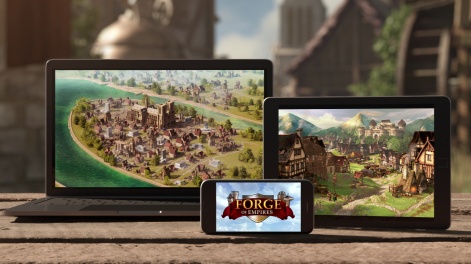The games industry plays host to a colourful cast of diverse individuals, from artists and coders to narrative designers and studio heads.
The skills to pull off these roles, however, are complex and differing, with each position requiring mastery in its field.
To highlight some of the brilliant work that goes on behind the screen, and help others who may be keen to dive in, PocketGamer.biz is reaching out to the individuals who make up the games industry with our Jobs in Games series.
This week we spoke with Modern Times Group EVP of esports and gaming Arnd Benninghoff.
PocketGamer.biz: Can you tell us about your current role and what it entails?
Arnd Benninghoff: I am the executive vice-president of esports and gaming at Modern Times Group, often referred to as MTG, a Swedish strategic investment company that specialises in global investments in gaming and esports. Our mission is to be the preferred home for companies and entrepreneurs in these verticals, offering them the industrial expertise, know-how and financial flexibility to take their businesses to the next level.
The esports hype has been driven by its novelty and the potential for it to become one of the biggest sports categories in the world...Arnd Benninghoff
We have a portfolio of companies in the two verticals, comprising some of the strongest brands in these two separate but intertwined industries with ESL Gaming. As of September, this now includes DreamHack making up the esports portfolio, and InnoGames, Kongregate and our latest acquisition Hutch making up our gaming portfolio.
While I’m German and live in Munich with my family, our headquarters is located in Stockholm, Sweden, where the majority of our team is based.
My role is to lead and manage MTG’s strategic investments across our portfolio, heading up the in-house mergers and acquisitions and games vertical team to build relationships with the strongest entrepreneurs in these high growth industries, as well as identifying strong and strategic partnerships and acquisitions to pursue.
I also work closely with our portfolio company’s CEOs to further develop their respective businesses and I am a board representative for some of our biggest companies, including ESL, InnoGames and Kongregate.
How did you first get into games and how did you progress into this role?
I actually started my career as a journalist, working for Deutsche Presse Agentur, a German news agency and various TV networks. I have always had an interest in games and esports since I led the digital transformation of Pro7 Sat1 Media AG, a German TV broadcasting group, where we built a games publishing business.
What did you study (if anything) to get your role? What courses would you advise for aspiring professionals in the area?
I studied Business and Administration with Communication but the academic studies are often secondary; more importantly, they allow you to explore where your interests lie and help to get to know different companies and branches.

New academic courses like game design and even esports management offer new ways to prepare for a job in the games and esports industries.
Do you think there are any misconceptions, public or professional, surrounding your area of expertise?
There are still a few misconceptions and misunderstandings when it comes to esports since it's a fairly new industry. The esports hype has been driven by its novelty and the potential for it to become one of the biggest sports categories in the world over the next five years.
At the same time, there is a tendency for investors, journalists and analysts to compare esports to traditional sports, where of course esports can borrow many learnings, but the nature and future development of esports as an industry will be distinctively something new.
What advice do you have for someone looking for a job in this profession?
Just try to start somewhere - there are so many different doors into the games industry. Ideally, I’d recommend starting with an internship or by developing your own game idea.
The beauty of this industry is that you’ll find so many people driven by their passion and having fun working with games, which is something I haven’t really seen in other media or entertainment industries.
How has the shift from office to remote working impacted your role, if at all?
While living in Germany and working for a Swedish-headquartered company, working remotely is not new to me. However, as a whole, we at MTG have of course been impacted by the shift. Sweden, unlike much of Europe, has not imposed society-wide shutdowns at any point during the pandemic. As such, our everyday experience has been different than that of companies in many other European countries.
Just before the travel restrictions kicked in we flew to London and visited their offices, where we could experience their unique company culture first-hand.Arnd Benninghoff
When the pandemic hit Europe and Sweden in the spring of 2020, we were quite quick to introduce new guidelines to minimise and later prohibit business travel. In mid-March, the decision was made to recommend all employees work from home until further notice, and since then the majority of our team has worked remotely. We have allowed staff to work from the office if they so prefer, provided they have been able to get to and from the office without violating any local pandemic-related laws or regulations.
On a more personal level, and given that a large part of having entrepreneurs join our family involves building relationships with them, it's crucial to get out there and meet these gaming and esports entrepreneurs in person. With the shift to remote working, all of this had to change as face-to-face meetings have no longer been possible.
Now, all of our external pitch meetings and relationship-building conversations, as well as internal MTG strategy offsites and portfolio days, have to be done via video call. While everyone has managed to adapt fairly quickly, it is always more challenging to build relationships without that natural, face-to-face interaction.
What was the experience of acquiring a big company like Hutch under these conditions?
The key to the transaction was the personal relationship based on our shared values and vision for the business. In light of the huge interest in Hutch, it was important to meet in person and show the team how our decentralised "family model" works.
After some video calls, where we managed to create good energy between the parties, the Hutch team visited our office in Stockholm. Just before the travel restrictions kicked in we flew to London and visited their offices, where we could experience their unique company culture first-hand. In essence, it was great energy and chemistry with the Hutch team that helped us push this deal through in a short period of time.
What does your typical day look like when working remotely?
Variety and some social contact is important to me and keeps me energized. I try to plan my work day with some walks with partners or colleagues outside, video calls and sports breaks to get some balance.
I find video calls are more effective if they´re no longer than one hour. To learn something new from my home office, I’ve tried to introduce a new morning routine with daily meditation - but that's probably more of a new year's resolution than a remote-working habit!
What do you think are the biggest advantages and disadvantages of remote working?
When we are all able to look back on the very strange and challenging year that was 2020, I think it will be with mixed emotions. Of course, last year brought so many hardships for everyone, both personally and professionally, but I also recognise that as a global society, we have taken a great leap forward in terms of digital transformation; that, I think, is going to benefit us all in 2021 and beyond.
I am a firm believer in the saying, “when the going gets tough, the tough get going.” The biggest changes have of course been made by legacy industry companies, those who previously had not had the energy nor willingness to transition to a more modern, agile and flexible way of working. But I think we have also seen considerable progress in younger companies, those born in a digital era, who have had their own set of challenges to overcome when having to work in an almost entirely remote environment.
For MTG, as I'm sure with many other companies, the changes have taken some getting used to. For example, it’s much harder to create the same energy on back-to-back video calls as you get in an in-person meeting, and in some ways this has made collaboration more difficult. It’s fair to say that the learnings from last year will stay with all of us long after the pandemic is over, some of these changes have been good, but others I'm sure we will all be glad to see the back of.
Is there anything you wish you had known before moving to remote working?
Possibly knowing where the highlight feature was in Zoom far sooner than when I was alerted to its existence. As the size of Zoom calls grew during the pandemic year, it certainly came in handy at times.
Do you have any advice for others who are struggling to adjust to remote work?
It really depends on the respective home office environment and individual circumstances, but I think a clear set of rules, like fixed off-line time slots for when to stop working, are essential to keep a balance at home. Combining walks outside with phone calls or meetings can also help to escape the monotony of a video-call-dominated home office.
After the pandemic ends and if you were given the choice, would you prefer to continue working remotely or go back to working in an office?
Personally, I think that a mix of the two will be the best way to move forward. A hybrid format would meet the growing demand for more flexible working, while still reintroducing what most team members are longing for after this pandemic: the camaraderie of a workplace, the routine of the 9-5 and commute, and the excitement of meeting colleagues face-to-face, whether it’s for a creative workshop or an after-work drink.
Spending quality time in regular team off-sites will also help to create the right balance between remote work and office life. I think many companies fighting for the best talent and most motivated team members will start considering ways of working that include remote work, offered more actively as a relevant, natural and appreciated part of their offerings to new hires - together with the more established benefits and compensation categories like competitive salary, pension, paid vacation and parental leave.





















